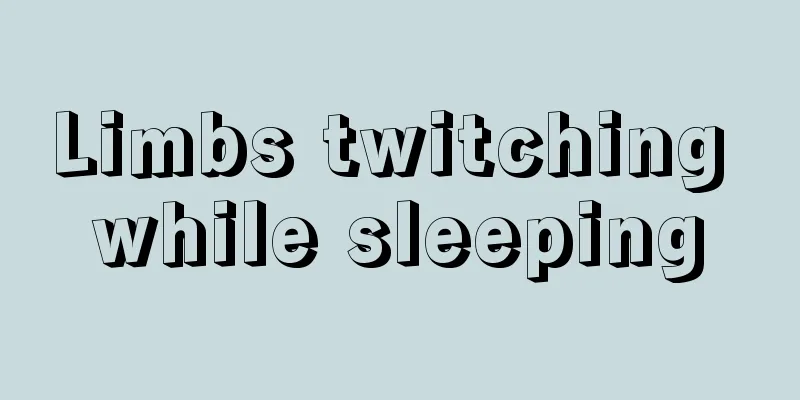Limbs twitching while sleeping

|
Everyone hopes to sleep peacefully when they go to bed, because peaceful sleep can effectively guarantee a person's sleep quality, thus making a person's mental state better the next day. But I believe that many people have experienced limb twitching while sleeping. However, most people ignore the twitching during their sleep. At this time, it is very necessary to properly understand the causes of limb twitching during sleep. First of all, don’t worry if this happens, it is not a disease. The reason for this, medically speaking, is muscle twitch, which is abnormal excitement of the nerves and muscles, causing the muscles to twitch rapidly and involuntarily. In simple terms, this is when the human body is sleeping and the muscles are still in the working state before sleep. At this time, the muscles have not completely entered sleep, and the brain unconsciously makes the muscles move through nerve cells. Because most of the body is in a dormant state, the nerve cells make the muscle cells move slightly, which is very similar to the twitching of the human body. We know that sleep usually goes through several stages. First, you gradually enter deep sleep from light sleep, and then after 45 minutes to 1 hour, you enter the rapid eye movement sleep stage. Sleep twitches occur during REM sleep. At this time, the cerebral cortex is inhibited and the higher centers have insufficient control over the subcortical centers. If some nerves are still relatively active, issuing some weak movement commands will cause the muscles to twitch rapidly and involuntarily, producing a sensation similar to that of an electric shock. This reaction is medically known as hypnic myokymia and is a very normal phenomenon, just like the muscle tremors we sometimes experience when we hiccup, overexert ourselves or are nervous. Why does muscle twitching occur? 1. Too much work. The pace of life of modern people has become very fast, and the work pressure has also increased. Coupled with some tedious things and poor sleep quality, it is inevitable that people will not be in good spirits and will be too nervous. 2. Calcium deficiency and low blood calcium levels lead to hyperexcitability of muscles and nerves, which in turn cause spasms and convulsions. 3. Liver and kidney deficiency, such as muscle twitching, is not very severe, but occurs frequently. It may be caused by liver and kidney deficiency and insufficient qi and blood. Therefore, it is recommended that everyone pay attention to self-stress relief, maintain a good attitude, relax appropriately, maintain a regular schedule, and live a happy life. It is important to note that if the twitching is too frequent or severe during sleep, it is a disease that will affect people's normal life, such as sleep epilepsy, periodic limb movement disorder, sequelae of cerebral hypoxia, and muscle twitching caused by drugs or toxins. This requires timely hospital examination to identify the cause and start treatment early to avoid delaying the disease. |
<<: The difference between convulsion and spasm
>>: What's wrong with the throbbing pain in my head?
Recommend
What is the mycobacterial chlamydial body
Many people cannot distinguish between mycoplasma...
What are the symptoms of hereditary diabetes insipidus
Diabetes insipidus may also be hereditary to a ce...
What causes blood in the toilet?
It is very common to have blood in the stool when...
Is lung cancer contagious? Lung cancer patients must know these common knowledge about the disease
In daily life, we should first have a good unders...
Are there any differences in the effects and functions of Ningxia wolfberry and ordinary wolfberry?
Wolfberry is a common herb. It is native to Ningx...
How to treat heel spurs
We may have all seen cases of bone spurs on the h...
Experts answer factors that affect the prognosis of melanoma
Clinically, the recurrence rate of melanoma is re...
What should I pay attention to if I have anorectal cyst?
The occurrence of anorectal cysts is generally ca...
How long does it take for a urine test to detect drug use
People who are under heavy pressure often choose ...
What are the most common symptoms of colon cancer
Among intestinal cancers, colon cancer should be ...
What are the methods for detecting chloramphenicol?
When it comes to chloramphenicol, many people may...
Discover the clinical symptoms of melanoma as early as possible
Melanoma is highly malignant and metastasizes qui...
Where is the carotid triangle?
The so-called carotid artery refers to the artery...
What are the symptoms of low potassium in the body?
Potassium is very important in the body. If the p...
What can’t be eaten with watermelon rind
Foods complement and counteract each other. Many ...









